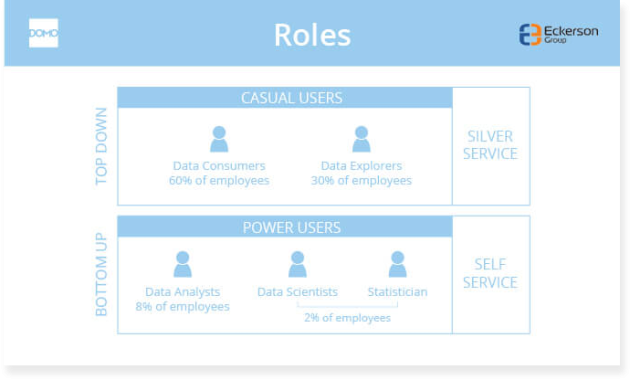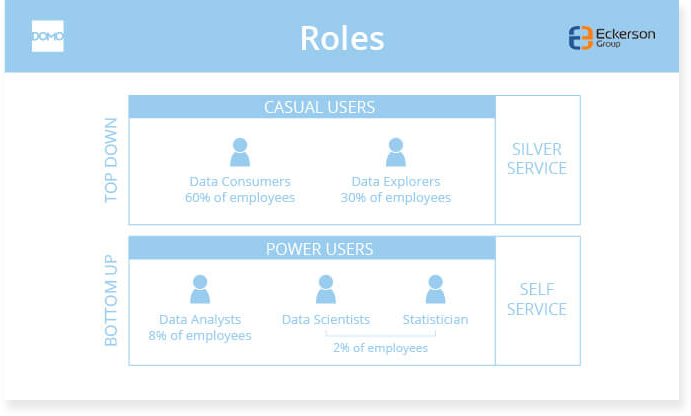
Self-Service Business Intelligence Software: A Paradigm Shift
In today’s fast-paced business environment, data is the new currency. Organizations are drowning in information, but the real challenge lies in extracting actionable insights. This is where self-service business intelligence software comes into play. It empowers users to analyze data independently, without relying heavily on IT or specialized data analysts. This shift represents a fundamental change in how businesses operate, fostering a data-driven culture.
This article explores the transformative power of self-service business intelligence software, examining its benefits, key features, and how it’s reshaping industries. We’ll delve into how this software enables businesses to achieve tangible results, leading to better decision-making and improved performance.
Democratizing Data: The Core of Self-Service BI
The primary goal of self-service business intelligence software is to democratize data. It puts the power of data analysis directly into the hands of business users. This means marketing teams, sales representatives, finance professionals, and other stakeholders can independently access, analyze, and visualize data relevant to their specific roles. This democratization eliminates bottlenecks associated with traditional BI approaches.
Historically, obtaining insights required submitting requests to IT departments or data analysts. This process was often time-consuming and cumbersome. Self-service business intelligence software streamlines this process. It provides user-friendly interfaces. These interfaces enable non-technical users to connect to data sources, create reports, and build dashboards without extensive coding or technical expertise. This allows quicker access to insights. This also promotes more agile decision-making.
Key Features of Effective Self-Service BI Software
Choosing the right self-service business intelligence software is crucial. Several key features distinguish effective solutions. These features contribute to their ability to deliver results. Some of the most important features include:
- Intuitive User Interface: The software should have a user-friendly interface. This allows users to easily navigate and understand the platform. Drag-and-drop functionality and visual cues are essential.
- Data Connectivity: Robust connectivity to various data sources is vital. This includes databases, cloud platforms, spreadsheets, and other data repositories. Compatibility with a wide range of data formats is critical.
- Data Visualization: Powerful data visualization capabilities are paramount. Users need to create compelling charts, graphs, and dashboards. These tools help them quickly identify trends and patterns.
- Data Preparation: The ability to clean, transform, and prepare data is essential. This ensures data accuracy and consistency. Features like data blending and data modeling are key.
- Reporting and Dashboards: The software should offer flexible reporting and dashboarding features. Users need to create customized reports. These reports provide insights tailored to their specific needs.
- Collaboration and Sharing: The ability to share insights and collaborate with colleagues is essential. Features like commenting, annotation, and secure sharing options enhance teamwork.
- Mobile Accessibility: In today’s mobile world, access to data on the go is important. The software should be accessible on mobile devices.
Benefits of Implementing Self-Service Business Intelligence
The advantages of implementing self-service business intelligence software are numerous. The benefits extend across multiple areas of a business. These include:
- Improved Decision-Making: Faster access to insights leads to better and more informed decisions. Users can quickly identify opportunities. They can also address potential risks.
- Increased Efficiency: Automating data analysis tasks frees up valuable time. This time is dedicated to strategic initiatives. It also reduces reliance on IT.
- Enhanced Collaboration: Data-driven insights are shared easily. This fosters better collaboration across teams.
- Cost Savings: Reduced reliance on IT and data analysts can lead to cost savings. Automation also helps streamline processes.
- Data-Driven Culture: Implementing self-service business intelligence software promotes a data-driven culture. This encourages data-informed decision-making at all levels.
- Faster Time to Insights: Users can get answers to their questions quicker. This leads to faster identification of trends.
Industries Benefiting from Self-Service BI
Self-service business intelligence software is applicable across various industries. It helps businesses of all sizes. Some industries that are particularly benefiting from this technology include:
- Retail: Retailers use self-service business intelligence software to analyze sales data. They also analyze customer behavior. This leads to better inventory management and targeted marketing campaigns.
- Healthcare: Healthcare providers use the software to analyze patient data. They also analyze operational efficiency. This leads to better patient care and streamlined operations.
- Finance: Financial institutions use the software to analyze financial performance. They also use it to assess risk. This supports better decision-making and compliance.
- Marketing: Marketing teams use the software to analyze campaign performance. They also use it to track customer engagement. This helps optimize marketing strategies.
- Manufacturing: Manufacturers use the software to analyze production data. They also use it to improve efficiency. This leads to reduced costs and better product quality.
- Supply Chain: Companies can optimize their supply chain with actionable insights. This leads to better inventory management and reduced lead times.
Choosing the Right Self-Service BI Software
Selecting the right self-service business intelligence software is crucial for success. Consider the following factors when evaluating different solutions:
- Ease of Use: The software should be intuitive and easy to learn.
- Scalability: The software should be able to scale to accommodate growing data volumes.
- Security: Robust security features are essential to protect sensitive data.
- Integration: Ensure the software integrates with existing systems.
- Support and Training: Look for software that offers adequate support and training.
- Cost: Consider the total cost of ownership, including licensing and implementation.
Real-World Examples of Self-Service BI Driving Results
Numerous companies have successfully implemented self-service business intelligence software. These companies have achieved tangible results. Here are a few examples:
- Example 1: A retail chain used self-service business intelligence software to analyze sales data. They identified underperforming product lines. They then adjusted their inventory. This resulted in a 15% increase in sales.
- Example 2: A healthcare provider used self-service business intelligence software to analyze patient data. They identified areas for improvement in patient care. This resulted in a 10% reduction in readmission rates.
- Example 3: A marketing agency used self-service business intelligence software to analyze campaign performance. They optimized their ad spend. They also improved their conversion rates. This led to a 20% increase in leads.
The Future of Self-Service Business Intelligence
The future of self-service business intelligence software is bright. Continued advancements in artificial intelligence (AI) and machine learning (ML) are poised to further enhance the capabilities of these platforms. We can expect to see:
- AI-Powered Insights: AI and ML will automate data analysis. They’ll also provide predictive insights.
- Natural Language Processing (NLP): Users will be able to interact with the software using natural language.
- Enhanced Data Governance: Improved data governance features will ensure data quality and compliance.
- Increased Accessibility: Self-service business intelligence software will become even more accessible. It will be more user-friendly.
As technology advances, self-service business intelligence software will continue to evolve. It will become an increasingly essential tool for businesses. These businesses aim to thrive in a data-driven world.
Conclusion: Embracing Data Empowerment
Self-service business intelligence software is revolutionizing how businesses operate. It empowers users to make data-driven decisions. This leads to improved performance. By democratizing data, this software fosters a data-driven culture. Businesses can unlock the full potential of their data assets. They can also achieve tangible results.
Embracing self-service business intelligence software is no longer a luxury. It is a necessity for businesses. These businesses aim to remain competitive in today’s rapidly changing world. By investing in the right tools and technologies, businesses can transform their data into a strategic asset. This will drive success and achieve their goals.
[See also: The Importance of Data Literacy in the Modern Workplace]
[See also: How to Choose the Right BI Tool for Your Business]
[See also: Data Visualization Best Practices]

